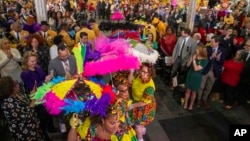New Orleans kicked off its annual Carnival season Friday, a weekslong celebration of joyous street parties, lavish balls and colorful parades — complicated this year by concerns over crime and a depleted police force that last year forced a shortening of Mardi Gras parade routes.
City officials marked the pre-Lenten season's start by dancing their way into an event amid brass band music, costumed revelers and giant figurines of jesters and fantasy characters at Mardi Gras World by the Mississippi River. The cavernous venue is where many parade floats are assembled and stored.
Other signs that the city was ready for Mardi Gras: Restaurants and bars began earnestly hawking king cake, a sugary seasonal delicacy; a group of masked revelers known as the ‘Phunny Phorty Phellows’ heralded Carnival with its annual nighttime streetcar ride on the historic St. Charles Avenue tracks; and the Krewe of Jeanne d’Arc, was to march through the French Quarter.
But the celebratory mood was underpinned by worries about continued violent crime that took hold during the pandemic, complicated by a police force that by various estimates has dwindled to about 900 members. That is hundreds fewer than what local experts say is needed.
Mayor LaToya Cantrell addressed the police issue at the morning event, announcing that the city planned to pay officers from outside police agencies to bolster local law enforcement during the season.
She also held out hope that parade routes might be restored to their traditional lengths — a possible boon to restaurants and bars that lost out on revenue last year due to shortened routes and the year before when the COVID-19 pandemic canceled parades altogether. And she said arrangements have already been made to restore the traditional route for one of the most popular processions, Endymion, February 18.
“If we collectively find the officers needed to support our krewes returning to the streets of New Orleans, there will be no real discussion about which routes are going to be affected or not,” Cantrell said.
Carnival officially begins each year January 6, the 12th day after Christmas, known as King's Day in New Orleans. It continues until Mardi Gras, or Fat Tuesday, the day before Ash Wednesday. Mardi Gras falls on February 21 this year.
New Orleans' raucous celebration is the nation's best known, but the holiday is also celebrated throughout much of Louisiana and the Gulf Coast. Mobile, Alabama, lays claim to the oldest Mardi Gras celebration in the country.





